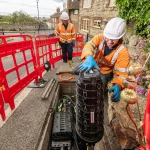Analyst Warns UK Cities Must Pick BT for Superfast Broadband or Risk Failure
The director of Informa Telecoms & Media’s global broadband and TV research, Rob Gallagher, has warned that any UK cities which win State Aid to boost their superfast broadband availability must pick “safe bet” BT to do the job or risk being left with no ISPs and “networks based on technologies that failed to keep pace with the wider market“.
Gallagher’s comments follow last week’s award of £114.1 million (Urban Broadband Fund) to help turn 10 of the country’s largest cities into “super-connected cities” that can deliver “ultrafast” (80-100Mbps+) broadband ISP speeds and “high speed public wi-fi” (here). The money is intended to only be used for upgrading internet access services in areas “not served by the private sector“.
Advertisement
However Gallagher points out that similar projects, specifically those that didn’t choose BT, often ended up being unable to attract big UK ISPs (e.g. TalkTalk and Sky Broadband) to their networks and were thus left struggling to survive.
Rob Gallagher explained:
“During the first wave of broadband rollouts, much of the government and EU funding to aid the spread of coverage ended up one way or another in the pockets of BT. Many local authorities and community bodies that choose alternative options ended up with networks based on technologies that failed to keep pace with the wider market or devoid of popular service providers, such as Talk Talk and Sky. The question for the cities is whether they want to take a similar risk on alternative players this time round or go for the safe bet of BT.
Alternative players are likely to bid with business models and technologies that promise consumers, businesses and service providers more flexibility in speeds, costs and other features than BT. But many alternative superfast broadband network operators elsewhere in the world have struggled to attract major service providers, which see working with these outfits as an unnecessary source of cost and complexity compared to working with incumbents like BT.”
This is perhaps a veiled reference to the endlessly troubled Digital Region network in South Yorkshire (related news). In fairness the Digital Region project was established by the public sector, which is hardly ideal (politicians rarely make good ISPs), and didn’t start out life as a fully-fledged telecoms provider. Meanwhile the country is home to plenty of generally smaller providers that have made some success out of delivering services in areas which BT itself has often neglected (e.g. Rutland Telecom, VFast, Hyperoptic etc.).
Gallagher also specifically references the example of KC in Hull. Some big ISPs, such as TalkTalk, have in the recent past complained that KC’s dominance of Hull effectively turned the area into a “digital island” because of its inability to offer a fully-fledged wholesale broadband and phone solution that rival ISPs would find attractive. By comparison BT is able to offer this through unbundled (LLU) lines, albeit only for the older generation of broadband services. But at least KC, unlike Digital Region, can turn a profit.
The analyst also notes that Sky Broadband and TalkTalk, much like other ISPs, remain far from happy with the “limitations and compromises that BT’s next-generation access network will impose on their costs and features they can offer“. Indeed at present it’s not possible to offer a fully unbundled fibre optic based FTTC or FTTP broadband solution, although Ofcom are known to be conducting investigations for the future. This is one area where BT’s rivals can often offer something more attractive but making the economics work isn’t an easy task.
Advertisement
Ultimately BT is considered a “safe bet” by many councils because it can actually deliver, even if the solution provided might not always be ideal. Some believe that the only real way to solve this is through tougher regulation or possibly even the complete removal of BTOpenreach, which manages access to BT’s network, from the control of its parent. So far Ofcom has preferred not to take such a rout and believes that the solution rests with less invasive regulation of existing services.
Mark is a professional technology writer, IT consultant and computer engineer from Dorset (England), he also founded ISPreview in 1999 and enjoys analysing the latest telecoms and broadband developments. Find me on X (Twitter), Mastodon, Facebook, BlueSky, Threads.net and Linkedin.
« WHSmith UK Launch FREE In-Store Wi-Fi Wireless Internet for Shoppers

















































Comments are closed